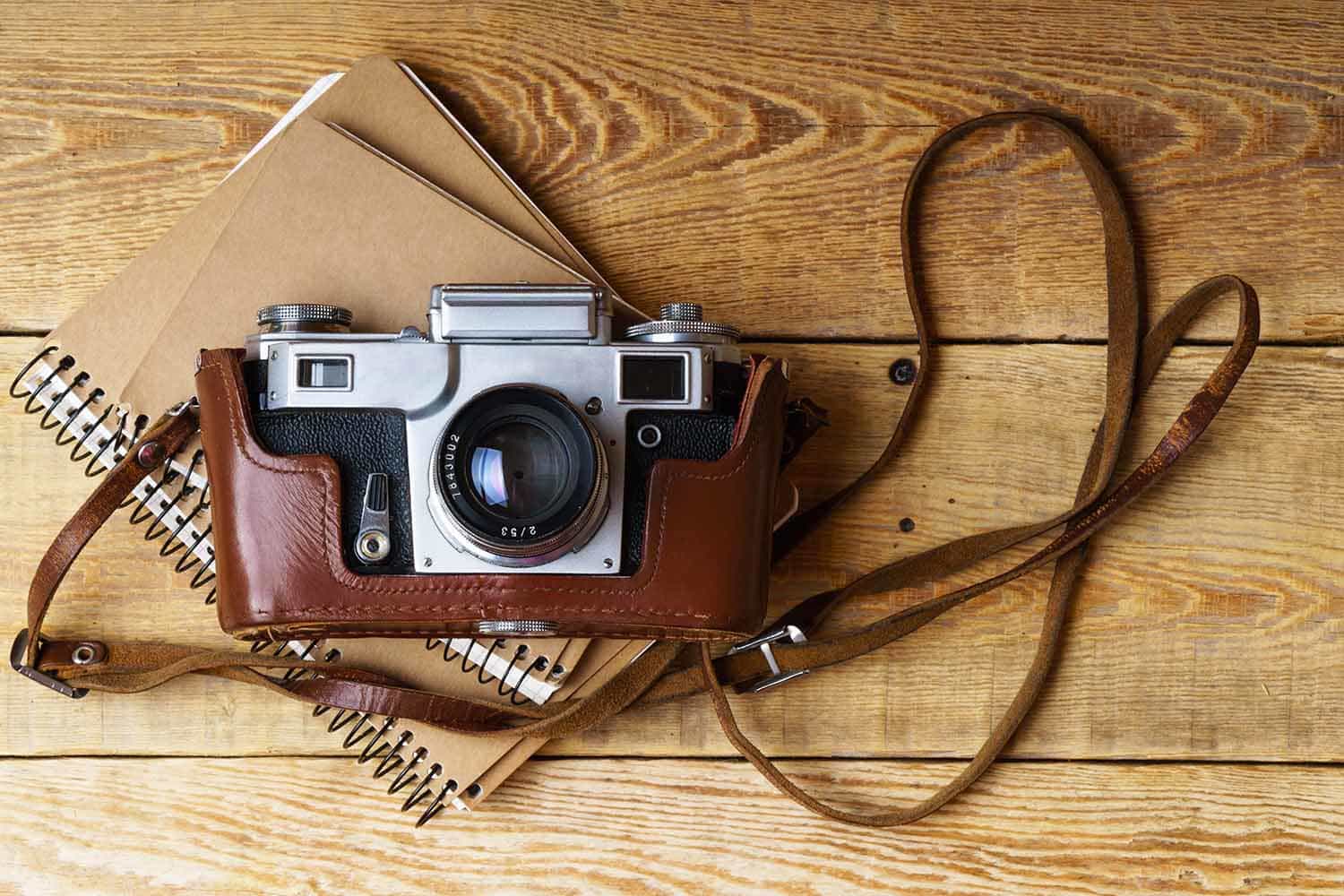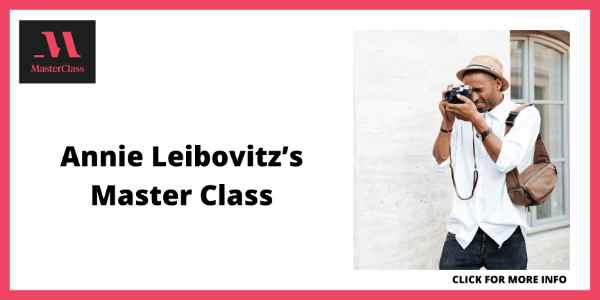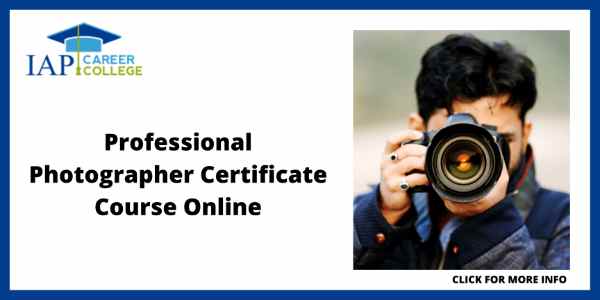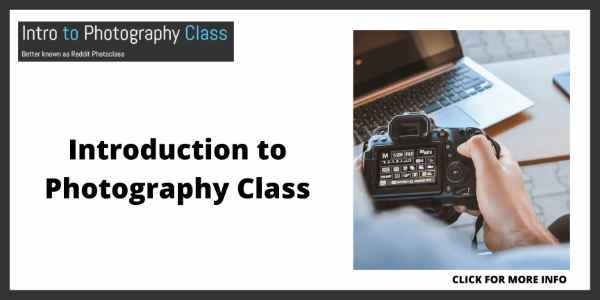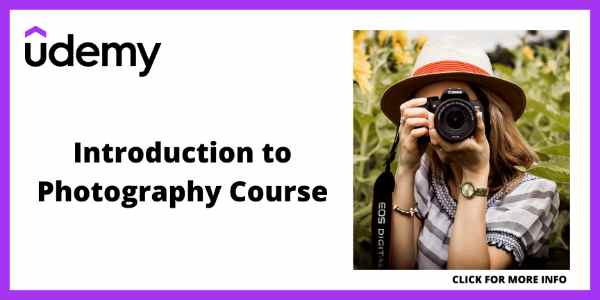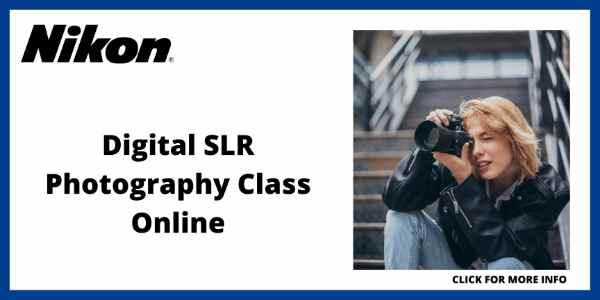After taking up an interest in photography, I found countless webinars and lessons online that helped teach me how to properly learn the craft. Looking back, those articles allowed me to develop a lifelong hobby, so I asked myself, what are the best online photography courses for other beginners?
What are the top 5 online photography courses for beginners today? Some of the best online photography courses for beginners include:
- Annie Leibovitz’s Master Class.
IAP Career College – Professional Photographer Certificate Course Online
- R-Photo Class
- Udemy’s Photography MasterClass
- Nikon’s Digital SLR Photography Class
After some digging on courses currently offered online, and comparing them with my own experiences, I found these top 5 courses for beginner photographers.
The Top 5 Online Photography Courses for Beginners:
Annie Leibovitz is possibly the most notable woman photographer ever. She was the first woman chief photographer at the Rolling Stone magazine, and she was the last person to take a picture of John Lennon.
Aside from her impressive resume, she teaches an equally impressive master class where she divulges all of her well-earned tips and tidbits about getting started in photography.
She talks about all the basic camera work and lingo necessary, but her class is unique because she gives personal perspective into studio photography as well. So, if you’re interested in doing portraits and glamour shots, this class is definitely for you.
This course by Master Class doesn’t require a specific camera, and again, not taking this class due to the cost of it would lose you the rare opportunity of learning from one of the literal greats.
There is almost no way to go wrong with this class. One of the most famous photographers of all time teaches you some of the highest quality information about beginning your photography career you will ever get. Albeit being expensive, you will end this class more confident in your art than ever.
2. IAP Career College - Professional Photographer Certificate Course Online
In this Professional Photographer Certificate course by IAP College you will master key ideas and practical step-by-step techniques for starting a career as a professional photographer!
The course was designed to be completed without the need of teaching assistance. However, if you need any assistance, you can contact a Faculty Member who can help you succeed in the course and in your career by providing personalized teaching support and guidance at any time during the course.
You will learn how to become a professional photographer, by going through:
- What a professional photographer does
- How to develop your skills so that you can succeed as a professional photographer
- How to start your own business as a professional photographer
- How to market and get clients for your photography business
The course training focuses on two types of photography: portrait and wedding photography. The 3 main topics covered in the course include the following with the break-down of each topic:
What a Professional Photographer Does
- Services You Can Offer
- Portrait Photography
- Wedding & Event Photography
- Developing Your Skills
- Preparing and Presenting Images
Starting a Photography Business
- Develop Your Business Concept
- Opting for a Franchise
- Equipment and Supplies
- Financial and Legal Matters
- Staying Organized
- Working with Support Staff
Getting Clients
- Marketing Tools
- Marketing Techniques
- Referrals and Word-of-Mouth
- Tradeshows and Expos
- Getting Paid
This course has been designed to fulfill high academic standards, guaranteeing that you will be able to proudly exhibit the Professional Photographer Certificate you will get from the International Association of Professions Career College as a graduate!
3. R-Photo Class
Otherwise known as the Reddit Photoclass, this course is taught by Alex Buisse, a professional adventure photographer who has graciously decided to offer his wisdom for those just getting started in the business.
This class consists of 30 constantly accessible lessons. They are in the form of articles broken down into easily readable sections that detail the basics of photography.
These lessons are fully public on Reddit, which means anyone at anytime can access them and learn without having to pay or sign up. This allows for you to take the course at your own pace while still making you feel like you are learning fundamental information.
Bruisse does a tremendous job at defining the lingo of photography clearly so anyone can learn and apply the techniques and advice he gives. He is beyond thorough, so after reading his lessons you will feel like a professional photographer.
There is no grading or feedback for this course, but there are assignments the instructor encourages you complete so you can get the most out of the class. If you choose not to complete the assignments, though, you can still learn a lot from his written lessons.
Occasionally, this instructor will offer a limited-time live session where you would be able to get feedback from other students, but you would need to sign up for that class when it is available.
4. Udemy’s Introduction to Photography Course
If you’re looking for a beginning photography course that is a complete guide to photography, then Udemy’s course is perfect for you.
Phil Ebiner, a previous professional photographer, has been teaching one-day photography courses all over the world, and now he has uploaded a two-hour seminar that can teach you all you need to know about getting started as a photographer.
He starts by explaining basics things like camera usage and terminology but works his way up into the more complicated aspects of photography so you can get a well-rounded education in a short but paced-out time.
His students brag that his teaching style is very easy to understand but doesn’t make them feel like amateurs. He speaks in a way that makes people feel as if they are just as experienced as he is.
Through Ebiner’s class, you can learn everything you need to know about photography in an inexpensive and time allotting way.
5. Nikon’s Digital SLR Photography Class Online
This course by Udemy is much like the other amazing beginner’s courses, but the only exception is that it does require a singular camera—the Nikon DSLR.
The price of this course typically runs around $30 on Updemy.com, so if you already have the camera, it is rather cheap in comparison to some others.
The course is a one-hour long video put together by a team of professional photographers. It covers how the basic camera functions as well as the more complicated ones on the Nikon DSLR.
Its goal is to help you learn to use this specific camera like professional photographers use it, so you can be capable of comparable works. The course also tries to instill in its students a watchful and easily inspired eye that is open to capturing the beauty of the world (through the Nikon camera, of course).
If you own this particular camera, it would be very wise to take advantage of this class because it is tailored for your usage and it provides high quality training by those in your field of interest.
What Is the Average Cost of an Online Photography Course?
There is a never-ending list of online beginner’s photography classes that can be found on the internet. And most of them are reliable and good classes, and while you’re weeding out which classes you don’t want to take, maybe take a look at the cost.
It is always important to note that cameras and lenses are not cheap and buying a lower quality camera would result in lower quality work, no matter how talented you are.
When you are looking for a class to take and you are doing a cost-benefit analysis of what they can offer you, also factor in how much your personal supplies would cost alongside the cost of the class and its specific materials.
Photography classes themselves have a wide array of price ranges. Surprisingly, there are a lot of online classes that are of high quality and are absolutely free.
For an absolute beginner, the free classes are the ones you want to try first. You can take as many as you’d like, and in the end, if it did not help at all, it didn’t cost you a penny.
Other beginner’s courses can range anywhere from $10 to $200. The price is typically determined by who is teaching the course. A freelance photographer who has a minimal, but steady income from their business might offer a webinar for only ten dollars, but they might not have the quality of expertise you wish to learn from.
If a well-known photographer teaches a one-time only master class, you can expect to have a higher price for the session. Of course, how can you put a price on such a limited opportunity to learn from one of the greats?
The higher priced classes could also mean they include more topics and sessions than others. It makes sense that a class that includes 30, one-hour instructional videos would cost more than a one-hour video class.
For the average course, it is most common to pay somewhere between $30-$70 for the class itself, not including extra supplies. This is a reasonable base price for a class that would ensure a decent teacher and good quality class, while also not making your bank account cry with displeasure.
Keep in mind to look at the list of materials needed for the class. If a course covers a section on editing your photos, the software the class calls for can also be very expensive. Like the classes themselves, the higher the price range for materials usually signifies a higher quality.
So, if you’re not willing to pay more due to materials and software, make it a top priority to look for the list of materials for the class. Yet, if you are willing to pay more for higher quality learning experience, factor those costs in.
It’s hard to put a definitive cost on an average photography class because they vary so much in content and supplies, but it is important to know that photography isn’t cheap. Yet, if it is something you truly enjoy doing, the joy from the photography would justify the costs.
Here are some tips on comparing the costs of online courses:
- Decide on how much you want to spend.
- Decide which course benefits your style of photography best.
- Compare each course’s cost for materials.
- Choose the class that makes you financially comfortable as well as allows you to hone your skills.
The Best Free Online Photography Resources
As the world moves into a more arts-friendly society, resources are becoming steadily more available to use for artists to use. But the best ones are those that are free, because why pay money to be able to develop and share your passion?
So, what inexpensive resources are available for photographers?
- Tips and technique blogs
- Editing software
- Portfolios and galleries
- Scheduling apps
Many of the resources created are geared to help those photographers that are attempting to set up their own businesses, but any photographers can use these resources whether they be a professional or a self-indulging hobbyist.
As you now know, there are many free classes that are open to photographers to take at any time. But if you don’t have the time to dedicate to an actual class, there are plenty of other ways to get helpful advice for your photography skills.
Everyone is an expert in their own view, and they all want to share their expertise. There is an abundance of online blogs and articles that are written everyday by professionals and amateurs alike who wish to share what they know.
A lot of them are actually very helpful. There are blogs for anything you might want to know, ranging from technique tips to the best types of cameras to types of business clientele to search for.
It’s always best to learn from others who at least seem to know what they’re doing, so use their free wisdom to your advantage.
There are also lots of free editing softwares available to download or use online. Most editing services are used to do simple touch up or dramatic effects. The best softwares tend to be very expensive, though.
It is best to use what you can to your advantage, and all the free softwares online can do whatever the expensive ones can, as long as you know how to use them. (And you can always find out how on all those very helpful and free blogs!)
Some editing softwares provide templatized edits that can be adjusted according to your picture. These are important for fast touch-ups and quick turnaround rates that still provide beautifully aesthetic work.
One of the most important parts of starting a photography business is getting your work in the public view. You have to put your work out there so people will learn your talents and offerings to the business.
But why pay for that if you don’t have to? Almost everything is online now, and people spend more time on the internet than they do talking to people face to face. Having an online portfolio of your works would give you a professional personality that is easily accessible by everyone.
There are many places to present your works for free. All social media platforms— like Instagram, Facebook, and Pinterest— offer free opportunities to create pages that would provide space to post pictures, gain clientele, or simply show your hobby off.
There are also online galleries that upload photos from both freelancers and professionals to give them free platforms to expose their works to the public for them.
Some apps and softwares are made specifically to help make portfolios and galleries via free templates. These are a good, basic way to organize your photos to send them to clients or post them elsewhere.
Another very important and free resource for photographers are all of the scheduling apps that exist. They allow clients to book you and keep all your business dates in one location, which is a necessity for those with artist brains.
What Is Taught in an Online Photography Course?
Beginner’s photography courses are very straightforward in their content. Every class won’t be the exact same, of course, but they will be similar in what they cover. They are meant to cover the absolute basics of photography.
Here’s a list of the basic topics usually covered:
- The different types of cameras
- The importance of lenses
- How to understand the mode settings on your camera
- How to make a good photographic composition
- How to work with your subject
- How to be satisfied with your work
When it comes to choosing what type of camera you want to use, you cannot be too careful. That is, after all, the basis of photography.
Most teachers in these online classes will cover the different types of cameras within the first few lessons. Whether you are learning about video cameras, DSLRs, travel cameras, or simply the camera on your phone, you will learn about them in a few lessons.
Whoever is teaching will definitely preach about their favorite camera, but they might give insight about what qualities to look for in a camera to fit in with your photographic goals.
If a class requires a specific type of camera, it will list that camera, but that class should still cover the different types of cameras. Different types of cameras have different quality resolutions, so its important to know your options moving on after the class.
Digital cameras have higher resolutions, but some have higher resolution qualities than others. This is why discussing the different types of cameras and their qualities at the beginning of a photography course is very important.
Differing camera types typically lead into the discussion of the importance and usage of lenses. The lens of the camera determines a lot about the quality and focus of the image. They are the main conduit of photography techniques.
The lenses are what give photos a more zoomed in look. The shorter a lens is the more you will be able to fit into a photo, whereas a longer lens will be used for more detailed and focused subjects. The class should cover when to use a shorter lens versus when you use a longer one.
A lens also helps determine light exposure factors like shutter speed, ISO (the light sensitivity), and aperture. The class will teach you what these are and how to adjust your lens so that your pictures do not get washed out by light or become too sharp.
Lenses are just as important as the camera itself, so using the wrong lens can make it impossible to get the exact photo you want, so that is why classes cover this towards the beginning alongside camera types.
Lenses can be controlled manually or by the camera itself. These functions are determined by the camera mode, which are sometimes referred to as gears. Your class will also cover where to look for your mode buttons and which modes result in what.
The auto-focus camera mode determines what the exposure should be, the focus, etc.— but it is up to the user to know when to use which mode if they do not like the automatic settings.
The mode buttons can be confusing because they are usually little wheels with a switch that points to what seem to be random letters around the circumference, but never fear, because your class will cover what all those letters mean and when to use them which one!
After teaching you the basic functions and definitions of the technical sides of the camera and photography itself, the class will introduce how to mesh those things with your own artistry via the composition basics.
A composition in photography is the artistic way the photographer chose to lay out the elements in the photo. The ‘basics’ are simply the common and understood rules to creating a visually pleasing composition.
Some common rules that will be covered in your class will be the rule of thirds, the usage of the elements and principles of design (like shape, color, line), and the rules of framing and edges.
All of these rules and elements will be broken down and explained in the context of photography during your class. For example, framing would lead into the discussion of angles and how your angle determines what the viewer sees as the focal point of the photo.
Eventually this discussion would lead into the topic of editing. Some instructors may cover the advantages of different types of software, but they may only cover what they use most personally.
They will cover how to adjust the exposure, color hue, temperature, focus, and many other things within your photo to not only adhere to the composition basics, but also show your own creativity through your picture.
Lastly, after you know all the basics of photography, your instructor will begin to teach you how to be a true photographer. You will need to learn two things: how to work with your subject and how to be satisfied with your work.
Subjects in a photograph are hard to handle. As the photographer, you have your own vision of what you want, while they have theirs (even if it a pineapple). But part of your job as the photographer is to be patient until you are both satisfied.
Satisfaction is one of the hardest things to achieve, though, but you have to accept that your work almost never comes out the way you expect it to. That doesn’t mean that your talent is garbage, but rather it is different than what you pictured it to be. Still great, just different.
Your class will teach you every tool you will need to know to get started as a photographer. Though, the most important thing these classes will teach you is how to be inspired by your surroundings and embrace your creativity through photography.
Do You Need a Course to Become a Photographer?
These top 5 beginner’s photography courses have a lot of advice to offer to those getting started in the photography business. But that does not mean you cannot be a successful photographer without them.
There are all sorts of resources available to help you get yourself started— like the online galleries, scheduling apps, blogs, social media platforms. If you truly want to become a photographer without feeling like you are wasting time and money with a class, it’s absolutely doable.
Here are some tips on getting started:
- Research different types cameras and pick what suits your style best
- Start taking pictures of whatever inspires you
- Look at editing softwares until you find one that offers you the most creative freedom.
- Start a social media page and post your art like crazy
The advantage of taking a class is much like the reason for getting a college degree—to show that you have training in that area.
For those that have no prior experience with photography, gaining a client base or taking extraordinary photos with unique edits will take longer to attain without classes like these.
It is not impossible to become a photographer without taking a class, but it may take more time. Yet, if you truly love photography so much, why not take the opportunity to learn more about your passion?
So, whether you are just trying to take a photo of you swimming with pigs or you are creating a travel blog stie, these photography courses are perfect for you!
Looking to enhance your photography skills from the comfort of your home? Check out these top-notch travel photography courses online for expert guidance and inspiration.


